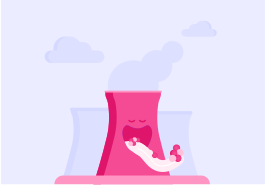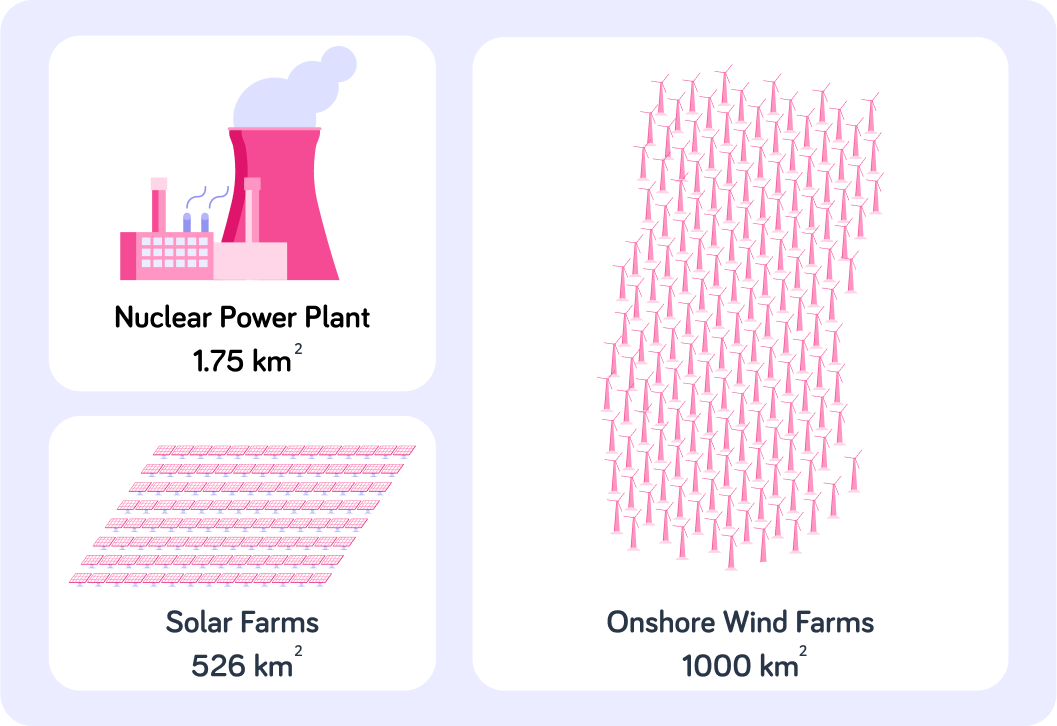YOU ARE LEARNING:
Advantages of Nuclear Power

Advantages of Nuclear Power
Here we learn about the advantages and disadvantages of nuclear power for generating electricity.
Nuclear energy is by far the most concentrated form of energy. What do you think this means?

So we don't need loads of fuel to create large amounts of energy. That means that nuclear power is pretty cheap when it comes to...

Nuclear power doesn't need lots of fuel to create large amounts of energy, so it's quite cheap to transport the fuel. Also, nuclear power is actually relatively inexpensive to produce.
But nuclear power is not all cheap! What do you think makes it expensive? Pick all the options you think are correct.

You can select multiple answers
So transport and production is quite cheap for nuclear power. On the other hand, nuclear power stations are very expensive to set up and it costs a lot of money to get rid of the dangerous, radioactive waste products.
The disposal of radioactive waste products is expensive and difficult. It must be stored in a way that prevents putting people, animals and the environment at risk of irradiation. How do you think that's done?

Is nuclear power safe?
Nuclear power actually has a high safety record.
However, if something does go wrong, it can be a major disaster! One such disaster occurred on 26th April, 1986, in Ukraine. Ever heard of Chernobyl?
What do you think happened at Chernobyl?

When the nuclear reactor at Chernobyl exploded, it released more ___________ than an atomic bomb!

The disaster at Chernobyl cost many people's lives.
Reaction staff and emergency workers died, and thousands of people have suffered from cancer because of it.
So is nuclear power safe?

The Chernobyl disaster was the world's worst nuclear disaster.
However, this was a very unusual event. There have been very few accidents in general, so nuclear power is in fact considered to have a good safety record!
A nuclear power station and a fossil fuel power station are actually quite similar, but not completely. How is a nuclear power station different to a fossil fuel power station? Pick all the options you think are correct.

You can select multiple answers
So nuclear and fossil fuel power stations generate electricity in the same way (by turning turbines with steam), but nuclear power plants use a different type of fuel and they use nuclear reactions to release the energy in the fuel instead of burning it.
True or false? A nuclear power station does not produce any sulphur dioxide or carbon dioxide.

Energy is released from the uranium fuel in a nuclear power station by nuclear fission, not by combustion (burning). That means that it doesn't release carbon dioxide into the atmosphere. It also doesn't release sulfur dioxide so it doesn't contribute to acid rain.
The fact that nuclear power stations don't release carbon dioxide into the atmosphere means that they don't contribute directly to _________ ___________.

Like fossil fuels, we have to mine the uranium that we use as fuel in nuclear power stations, so nuclear power is...

Of course there are other energy resources that are actually renewable, like wind, solar and water power.
The image shows the area of land needed for nuclear, wind, and solar power to produce the same amount of electricity.

Which energy source uses the least land, to produce the same amount of electricity?


So a nuclear power plant takes up less land compared to wind and solar power to produce the same amount of electricity. Is this an advantage or a disadvantage of nuclear power?


Also, wind and solar power rely on the weather to produce electricity, whereas nuclear power does not. This means that nuclear power is...
A) less reliable than solar and wind power. B) just as reliable than solar and wind power. C) more reliable than solar and wind power.
Answer A, B or C.


To recap!
Nuclear power releases no polluting gasses, like for example fossil fuel power stations do.
This means that nuclear power stations don't contribute to global warming or to acid rain.
However, nuclear power is not a renewable energy source.
We have to mine for uranium and one day we will run out. It is estimated that we will be able to mine enough uranium only for the next 200 years or so.
On the other hand, nuclear power is more reliable than for example wind and solar power.
This is because nuclear power is not dependent on the weather.
